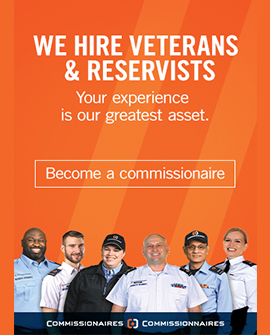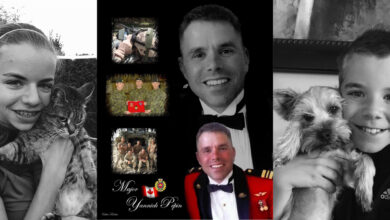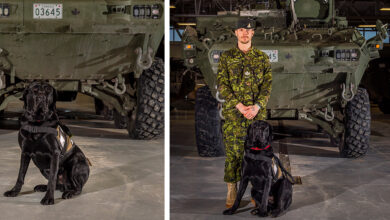Best of CMF Magazine
Linda Blanchette: One military family’s journey with post-tramatic stress disorder
By Linda Blanchette
In our Holiday Issue we began to share the Blanchette Family’s journey with post traumatic stress syndrome. Read the rest of the article here – in Linda’s words.
I was beginning to lose it. Finally, I went to talk to a social worker and the first person I saw told me to not to let it get to me. Let it go, he needs this; this is something he can control. Be patient and help him out. After a year or so I went to a different social worker, and I told her what was happening and as we talked, I told her that she was opening a Pandora’s Box. I realised I had shoved down so much, and I was afraid what would come out. I was blind to what was happening to my family and me.
Joss was sent to Bellwood Hospital in June of 2001 for alcohol and depression treatment. I have to say that while he was gone the kids and I seemed to be more relaxed and were able to joke around.
On the day before Easter weekend, I received a phone call from the base telling me that Joss was going to be released from the military on the following Thursday for medical reasons. He was half way through his treatment at Bellwood. If he got released, it would mean that his treatment would end as we could no longer afford to continue his stay there (the cost for treatment was approximately $10,000). I asked the base to give me 24 hours to tell him. In the meantime, I called Bellwood hospital and talked to his doctor who informed me that this situation could potentially push Joss over the edge.
I was desperate! Questioning what I could do. I had been given the name of a person that may help and called him. Rick asked me to give him some time, and he would look into it. I didn’t sleep a wink that night but finally on Good Friday around midnight Lieutenant Colonel Stephane Grenier phoned and told me that he was looking into the issue. He said he would call back before the end of the weekend. He called back Easter Monday and told me that Joss would be able to stay in the military for another year and that the paperwork would follow in a few days. This was a true Easter miracle!
As I got off the phone, I cried for a long time. Tears of joy, tears of relief, tears of frustration and loneliness rolled down my cheeks. I pulled myself together and called Bellwood to let them know that things were okay and the military would continue funding his rehab. I kept this secret from Joss for years before I shared with him what had happened.
In Aug 2002, Joss was released from the military, and it was a very sad day. He, we had given 29 years to the military, and there was nothing to make it special for him. Nothing to make his departure something memorable. It felt like Joss, our children and I were contagious with some type of evil they were finally ridding themselves of.
We lost a lot of friends, and neither of our families were close. We did not lose everybody, but we sure did feel alone. My husband had lost his identity. He was no longer a Military Police member, no longer a soldier and he felt that he was not providing for us anymore. Who was he in his eyes?
As Joss settled into retired life, he started to sleep a lot and would often hide in our computer room. Since he was no longer in the military his doctors were not there anymore, there was no help available, and he started to drink again. Joss had put up a wall, and there was no getting in. If we went to a restaurant, he felt he had to sit with his back against a wall so he could see the entrance. He would plan alternate routes to escape in case an intruder came in. We quit going to movies as he had anxiety believing when the lights went out his enemy would come in.
He could not go in to crowds as he did not feel safe. Noises bothered him. He was shutting down and not letting our family in. Joss had become a stranger in our home.
Joss got in trouble with the police and that was at my last straw. I finally gave him a choice. Go for help or I was going to leave with the kids.
Joss started to seek aid. He found a social worker who he still sees today. Through talking with her he started to get a grasp on what exactly PTSD was doing, not only to his body but also to his mind. He began to take note of his triggers. He started to realise that when he would feel anxious that it wasn’t a sign of weakness but a sign that the disease was rearing its ugly head. It took a while for his understanding of the disease to click, and I think the seeking to understand will be constant. Today he continues to learn more about himself and PTSD, every day isn’t perfect, but every day is no longer a struggle.
What about my struggle and that of my children over the past years? Always a strong person who stood up for myself and what I thought was right, as I look back I realize how wrong I was. Here I was watching the man that I love change, and I did not know how to stop our lives from going downhill. I was feeling alone. Oh, so alone. I would go into the shower and cry in to a face cloth as I did not want anyone to hear me. I was losing my best friend, my husband and the father of our children, my soul mate. I truly was spiraling down with Joss.
As Joss was drifting away I thought it was because of me, I thought it was all my fault. What was I doing wrong? Was he not attracted to me anymore? I began to live in fear, turning to junk food, not caring much about myself or my looks. So many of my friends did not want to hear from me, they quit coming over, or for that matter even calling. So I stopped talking. I put on a smile and pretended everything was okay.
Working full time and volunteering, I continued my involvement with Girl Guides. Whenever I had to go out, I always made sure the kids were with me or went someplace else. I lived in fear. It was easier to keep busy and to hide instead of facing what was going on. We walked on egg shells around Joss all the time, never knowing when he would get upset. I was also afraid that he would take his life. It did not matter what happened, I blamed myself for everything. And everything was my fault!
I was angry. I was so angry at him, at the PTSD for that matter. I was pissed off at the world. Why did my life have to change? I did not ask for this, So Why? Why me? Why us?
In 2001, I went to the MFRC (Military Family Rescue Center) to talk to Eve Lawrance. This was the start of my healing as I now know that I had to heal first in order to help my children. As I sat and talked to Eve and said, PLEASE help me. She said she would if I did the leg work. I knew there were other family members out there like me. They were suffering as well, our stories may be different yet we were all in the same boat.
So we started a peer group to meet twice a month. Sunday nights I would call my peers and check in. Some Sundays it took me a half hour, sometimes it took three hours depending how my peers were feeling. With time I was learning who I was. In late 2005 OSISS (Operational Stress Injury Social Support) came in to take a look at our group and in 2006 they made Peer Support groups for families across our great Country.
To date, I have worked with over 100 families as a peer. We were all alone, afraid, angry, lifeless and yet we got strength for one another. Some of us also thought of taking our own lives, others thought of running until they could no longer run. Some of us became “broken” and wound up in the hospital. We also suffered from physical illness due to our stress.
So does PTSD belong to our love ones alone? NO, it is our disease as well. I had learned that our love ones often had physical illness with their PTSD. I also learned that many of them have an addiction, whether it is alcohol, drugs, gambling, sex and the list goes on.
You may ask why I did not just leave. Yes, I gave up on myself and yes, I blamed myself for my family’s problems; I carried the world on my shoulders.
Now, having learned so much about myself I can share my many reasons for staying. Afraid to take the kids away from their father, I had lost my self-confidence and who I was. I gained close to 100 lbs and felt uncomfortable in my own skin. I was no longer me. How could I take care of my family? Also, even if it may sound corny, what about my wedding vows, when I said to marry in sickness and in health. I still loved him with all my heart, and now that he was ill I refused to just give up on him.
Over the years I have learned I did nothing wrong. I had a right to feel the way I did. We have learned to work together and to help each other as we travel through this terrible illness. We remembered it takes two for a relationship. We also remembered it takes 10o per cent from each of us to grow and only 50 per cent to leave.
Now that I was starting to heal I could help my children, I felt like a terrible mother as I realized what each one was going through. I had tried to make them think I was okay and that their life was going to be fine, but I did not do a good job of it. Our oldest was 11 when Joss left for Bosnia. Joss had told him he was the man of the house while he was gone and Marc took it to heart. He tried hard to fill his father’s boots.
As the kids and I got ready for Christmas they asked me if their Dad would be home and I told them “no”. I explained to them about the kids over there and that their Dad was helping them. My children then asked me if they could give some of their gifts to those children. So we went shopping and sent gifts to Joss for him to give out. Marc decided to write a play about his dad giving these gifts to the children over there. His teacher was so impressed that she had Marc and some of his classmates performed his play for the Christmas school concert. I was so proud of him for what he had done. Years later Marc told me that he saw me cry sometimes and that he knew that his dad was withdrawing.
As Joss got sicker, Marc continued to fill his father’s boots. If he saw the other two beginning to act up, he would act up more trying to take his father’s anger away from his younger siblings. After all he was the oldest and thought he could handle it better than them. He grew up too fast, and he always gave himself. From the time he was 11 he carried the world on his shoulder.
Christopher and Aime were eight when Joss was in Bosnia, Christopher was my quiet one. He took it all in and kept it there. He always read people and situations a little differently than most. Christopher was stronger than anyone knew. In 2007 at 20 years old, Chris joined the military. He has seen and helped his fellow brother and sisters in arms and understands the true meaning of PTSD. I am so proud that he can help others.
Last but not least, our daughter Aime. Aime acted out a lot and was not afraid to tell her father what she thought of him as she hated what he had become. At age 14 Aime wrote the following monologue and recently provided permission for it to be shared:
Click here to read The Unwanted Guest
The love Aime and her Dad have now is very heart warming. She makes me proud of how far she has come.
Taking everything into consideration I was very lucky with my children, so many other women I know had it so much worse. Some of their kids had gotten in trouble with the law, some ended up going to jail; others started cutting themselves; others turned to drugs and/or suffered from depression. This thing called PTSD can and has destroyed families!
This disease can take everything from you, and you have to fight it! Don’t suffer alone. We had lost most of our friends, and some of our family did not understand why Joss had changed, often telling us to “get over it and carry on”. Their messages did not ease stress if only it were that easy.
When Marc lived in Ottawa, he lived in a house with some friends going to college to become paramedics, police officer. These kids became like adopted kids to us. I saw some of them hurting, and I knew they needed help and all they needed was for someone to listen to them and give them direction, so they took care of themselves. I found help at our local Miliary Family Resource Centre and our Peer Group. The Peer Group is now known as OSISS (Operational Stress Injury Social Support).
I have learned to let people know that there is also help with the MFRC, OSISS, Alanon, Open Mind Open Line. But the first thing to understand is to NOT TO BE AFRAID TO ASK FOR HELP. You are not weak if you reach out. If you have a loved one or a friend that is ill, stand by them. They may try to push you away but be their shoulder to lean on. They may act out, but remember it is the PTSD talking, not them. They are hurting and do not want to hurt you. I am not saying it is easy, but it is possible.
Ask the doctors and social workers to hear you. Even though they may not be able to share information with you, you can share information with them. You know your loved one the best, and they are very good at deceiving their social workers, but you know that firsthand. Work as a team helps everyone heal.
It is time to take PTSD out of the closet and not to be afraid. You are not weak because you have PTSD; you are not weak because you love someone who suffers from it. Reach out, share and get support; together we can and will make a difference.
My pride for what my husband had accomplished for him, our family and country will never fade. He is my hero, a true hero.
While life for our family will never be as it was before PTSD, the love and pride I have for Joss and my family is different, but it is even strong now.
It has been a long walk through a dark tunnel, alone, scared and angry, but I now know I am not alone. Am I through the tunnel? NO, but I can see the light, and I no longer walk alone as there are others with me, and we are helping one another.
Above Photo: The Blanchette Family after learning skills to live with PTSD playing around when it comes the family fighting PTSD. (Front left to right) Christopher, Joss, and Linda. (Back left to right) Christopher’s spouse Trisha, Marc, Aime’s partner Scott and Aime.










